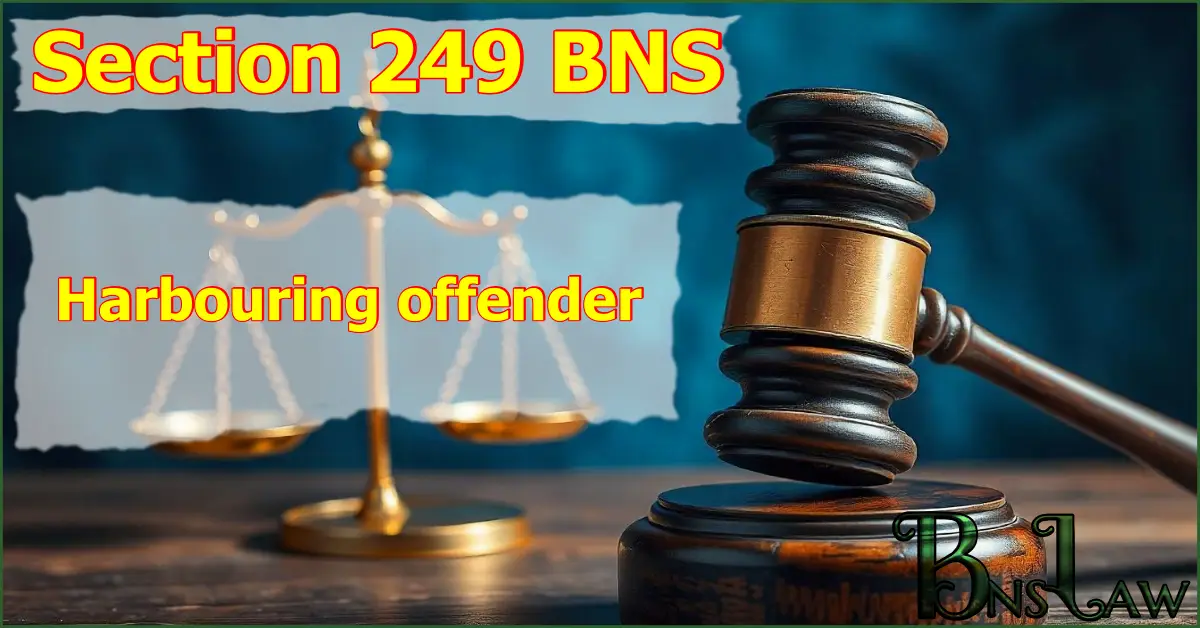Section 249 BNS | BNS 249 | BNS Section 249
Whenever an offence has been committed, whoever harbours or conceals a person whom he knows or has reason to believe to be the offender, with the intention of screening him from legal punishment shall,—
249(a) BNS
if the offence is punishable with death, be punished with imprisonment of either description for a term which may extend to five years, and shall also be liable to fine;
249(b) BNS
if the offence is punishable with imprisonment for life, or with imprisonment which may extend to ten years, be punished with imprisonment of either description for a term which may extend to three years, and shall also be liable to fine;
249(c) BNS
if the offence is punishable with imprisonment which may extend to one year, and not to ten years, be punished with imprisonment of the description provided for the offence for a term which may extend to one-fourth part of the longest term of imprisonment provided for the offence, or with fine, or with both.
Explanation— “Offence” in this section includes any act committed at any place out of India, which, if committed in India, would be punishable under any of the following sections, namely, 103, 105, 307, sub-sections (2), (3) and (4) of section 309, sub-sections (2), (3), (4) and (5) of section 310, 311, 312, clauses (f) and (g) of section 326, sub-sections (4), (6), (7) and (8) of section 331, clauses (a) and (b) of section 332 and every such act shall, for the purposes of this section, be deemed to be punishable as if the accused person had been guilty of it in India.
Exception— This section shall not extend to any case in which the harbour or concealment is by the spouse of the offender.
Illustration
A, knowing that B has committed dacoity, knowingly conceals B in order to screen him from legal punishment. Here, as B is liable to imprisonment for life, A is liable to imprisonment of either description for a term not exceeding three years, and is also liable to fine.
READ OTHER SECTIONS OF CHAPTER XIV — OF FALSE EVIDENCE AND OFFENCES AGAINST PUBLIC JUSTICE
FAQs of BNS Section 249
-
249 BNS punishment and fine
Punishment and fine under Section 249 of the BNS—
249(a): Imprisonment for 5 years and fine.
249(b): Imprisonment for 3 years and fine.
249(c): Imprisonment for one-fourth of the longest term, and of the descriptions, provided for the offence, or fine, or both. -
249 BNS cognizable or not
The offence under Section 249(a), 249(b) and 249(c) of the BNS is cognizable.
-
249 BNS bailable or not
The offence under Section 249(a), 249(b) and 249(c) of the BNS is bailable.
-
249 BNS trial court
Offence specified in Section 249(a), 249(b) and 249(c) of the BNS is triable by the Magistrate of the first class.
Important Points
- Cognizable Offences: These are offences where a police officer can arrest a person without a warrant.
- Non-Cognizable Offences: These are offences where a police officer cannot arrest a person without a warrant.
- Bailable Offences: These are offences where the accused can get bail from the police station itself. All bailable offences are listed in the First Schedule of the Bharatiya Nagarik Suraksha Sanhita (BNSS).
- Non-Bailable Offences: Offences in which bail is not granted directly from the police station but after hearing the case in the court, the judge decides when bail will be granted. All non-bailable offences are listed in the first schedule of the Bharatiya Nagarik Suraksha Sanhita (BNSS).
- In the above FAQ, “trial court” means the court that has jurisdiction to try the offence.
- In the above FAQ, the expression “Magistrate of the first class” and “Any Magistrate” does not include Executive Magistrates.
Read other Sections of the BNS
Reference Link: New Criminal Laws (BNS), Ministry of Home Affairs







